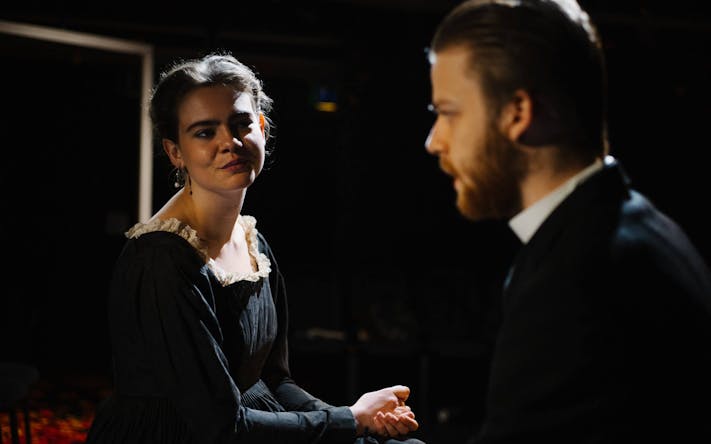Ibsen's Ghosts, in a stripped-down version by Richard Eyre that sweeps away the slightest vestige of Victorian fustiness, is here played out to a 45-seater Tuesday night full house, and packs an extraordinary amount of drama into its swift 90 minutes - cheating and lying, bitterness and hypocrisy, hereditary disease and crushed hopes, and that staple of classic tragedy: incest. Mrs Alving, a small-town widow, confides to her pastor her past and present plight stemming from her serial philanderer of a husband. Her son Oswald returns home from a long period abroad. His coming, longingly awaited by his mother, heaps further angst upon her as her simmering dreams turn overnight to burnt-out ashes.
Among a multitude of themes explored, the one that really catches the attention is the matter of change. Stasis present, or, in the case of Oswald, stasis about to resume after a hiatus, is experienced and anticipated by the characters. But during the play this stasis is rudely overturned as the characters are snatched up and whirled about by past and current events; and this occurs not just once but in a succession of hammer blows.
This is pure psycho-drama, not so much theatre in the round as theatre in the pressure-cooker. No audience member is seated more than two metres from the action, and director James Watt has employed every square centimetre of the tiny acting area to deploy his cast of five. He told me afterwards that he and they had put in eight hour days of preparation and rehearsal over three weeks - and didn't it show. Every intonation of speech, every gesture and movement seem to come naturally as an indication of character. The players, including a disabled sailor (a smarmy Alex Hill, seemingly raised on a Glasgow housing scheme) and the Alving maid (Sammy Glover), convincingly portraying a chrysalis developing into butterfly, seize and hold your attention with their intensity. As Oswald, Yash Saraf dwindles by degrees from seemingly-confident, cosmopolitan son into quivering wreck; his convulsions at the end had some of the audience holding their breath.
Isobel Jesper Jones' Mrs Alving strides forth boldly at the start of the play, another of Ibsen's strong but suffering women - others include Hedda Gabler, Rita in Little Eyolf and (ultimately) Nora in A Doll's House - whose men struggle to control. Ms Jesper Jones indicates she has always had a sharp eye for business - her exchange with Pastor Manders about whether their projected orphanage is to be protected by God or an insurance company brings a nice little note of humour to what is otherwise powerful tragedy - but her ultimate development into clear-sightedness regarding her plight and the nature of the people surrounding her is chilling, and beautifully handled by Ms Jesper-Jones.
Ieuan Perkins' Pastor Manders manages to be at one and the same time pompous, cowardly and gullible; subtle acting. Perhaps the most striking moment of the evening comes when, slumped on a couch, Mrs Alving tells him sotto voce:
'I think you're a big child and always will be.'
No doubt, but both of them are playing in serious, grown-up drama, and if you're in search of that this week, then the BT Studio is the place to find it.




